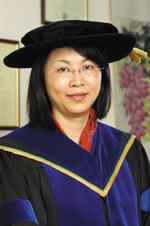
a milestone in the University's history.
To date, a total of 120 Endowed Professorships have been established.

 |
May Professorship in NeuropsychologyThe donor, who wishes to remain anonymous, has entrusted this gift to the University for the furtherance of research which will bring benefits to all humankind. Anonymous |
 |
Tatia M C LeeAppointed in 2010 The Department of Psychology has a track record of research excellence. It trains top-notched clinical psychologists to find sensible ways to deal with challenges in the community, and informing the public, government and non-government organisations on how to improve the well-being of the people of Hong Kong. Neuropsychology studies the human brain and its relationships with specific cognitive/psychological processes and behaviours. The Laboratory of Neuropsychology, founded by Professor Tatia Lee, is based in the University’s Department of Psychology. With years of dedication to research, members of the Laboratory have been rigorously involved in investigations of neurocognitive functions in both healthy and clinical populations. It utilises its findings and incorporates them into rehabilitation schemes for a diverse range of neurological patients. Professor Lee joined HKU in 1996 and has also been appointed an Honorary Professor of the University’s Department of Medicine and Department of Psychiatry. She serves as Honorary Consultant Clinical Neuropsychologist and Honorary Advisor to local hospitals. Her research is at the frontier of neuropsychology. Marrying the strength of neuroimaging and behavioural methodologies, Professor Lee and her team have pioneered research on understanding the social-cognitive-affective mechanisms underlying higher cognitive frontal function, the very function that defines a human as a human. Her research interests extend to cover normal ageing and development across the lifespan, pathological changes and sex-related differences. Professor Lee’s research team published the first few studies that observed and reported on brain activities associated with deception. Her research on domestic violence points to a new treatment direction for spousal abusers. Building upon the empirical work accomplished, Professor Lee has been exploring and developing strategies that could modify or maximise brain functioning (neuroplasticity) via exercising impulse control and emotion regulation for beneficial decision making. Using advances in cross-modal neuroplasticity, Professor Lee is developing interventions for promoting brain health to combat the normal ageing effects and the adverse changes to brain functioning due to clinical conditions. In addition to theoretical research, she has devoted much effort to devising comprehensive assessment tools, normative data, and evidence-based intervention for patients with brain injuries. Professor Lee has been bestowed with numerous awards for excellence in teaching and research. In recognition of Professor Lee’s valuable contributions to clinical psychology and clinical neuropsychology, she was elected a Fellow of the Society of Clinical Psychology and Division of Clinical Neuropsychology of The American Psychological Association. She publishes in high impact journals, is an elected editorial board member of leading journals in the fields of Neuropsychology, Social Neuroscience, and Behavioral Neuroscience, and is a regular reviewer of 45 international journals. |